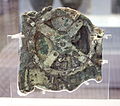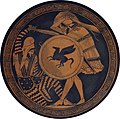ancient Greece
Ancient Greece (Greek: Ἑλλάς, romanized: Hellás) was a northeastern Mediterranean civilization, existing from the Greek Dark Ages of the 12th–9th centuries BC to the end of classical antiquity (c. 600 AD), that comprised a loose collection of culturally and linguistically related city-states and other territories.
The Ancient Greece Portal

Most of these regions were officially unified only once, for 13 years, under Alexander the Great's empire from 336 to 323 BC. In Western history, the era of classical antiquity was immediately followed by the Early Middle Ages and the Byzantine period.
Three centuries after the Late Bronze Age collapse of Mycenaean Greece, Greek urban poleis began to form in the 8th century BC, ushering in the Archaic period and the colonization of the Mediterranean Basin. This was followed by the age of Classical Greece, from the Greco-Persian Wars to the 5th to 4th centuries BC, and which included the Golden Age of Athens. The conquests of Alexander the Great spread Hellenistic civilization from the western Mediterranean to Central Asia. The Hellenistic period ended with the conquest of the eastern Mediterranean world by the Roman Republic, and the annexation of the Roman province of Macedonia in Roman Greece, and later the province of Achaea during the Roman Empire.
Classical Greek culture, especially philosophy, had a powerful influence on ancient Rome, which carried a version of it throughout the Mediterranean and much of Europe. For this reason, Classical Greece is generally considered the cradle of Western civilization, the seminal culture from which the modern West derives many of its founding archetypes and ideas in politics, philosophy, science, and art. (Full article...)
Selected article -

In Greek mythology, Orion (/əˈraɪən/; Ancient Greek: Ὠρίων or Ὠαρίων; Latin: Orion) was a giant huntsman whom Zeus (or perhaps Artemis) placed among the stars as the constellation of Orion.
Ancient sources told several different stories about Orion; there are two major versions of his birth and several versions of his death. The most important recorded episodes are his birth in Boeotia, his visit to Chios where he met Merope and raped her, being blinded by Merope's father, the recovery of his sight at Lemnos, his hunting with Artemis on Crete, his death by the bow of Artemis or the sting of the giant scorpion which became Scorpius, and his elevation to the heavens. Most ancient sources omit some of these episodes and several tell only one. These various incidents may originally have been independent, unrelated stories, and it is impossible to tell whether the omissions are simple brevity or represent a real disagreement. (Full article...)Selected location -
Attica (Greek: Αττική, Ancient Greek Attikḗ or Attikī́, Ancient Greek: [atːikɛ̌ː] or Modern: [atiˈci]), or the Attic Peninsula, is a historical region that encompasses the entire Athens metropolitan area, which consists of the city of Athens, the capital of Greece and the core city of the metropolitan area, as well as its surrounding suburban cities and towns. It is a peninsula projecting into the Aegean Sea, bordering on Boeotia to the north and Megaris to the west. The southern tip of the peninsula, known as Laurion, was an important mining region.
The history of Attica is tightly linked with that of Athens. In ancient times, Attica corresponded with the Athens city-state. It was the most prominent region in Ancient Greece, specifically during the Golden Age of Athens in the classical period. Ancient Attica (the classical Athens city-state) was divided into demoi, or municipalities, from the reform of Cleisthenes in 508/7 BC, grouped into three zones: urban (astu) in the region of Athens main town, and Piraeus (the port), coastal (paralia) along the coastline, and inland (mesogeia) in the interior. (Full article...)Did you know...
- ... that the Greeks did not have a term for "religion"?
- ... that Ancient Greek cuisine was characterized by its frugality, reflecting agricultural hardship?
- ... that the economy of ancient Greece was characterized by the extreme importance of agriculture, all the more so because of the relative poverty of Greece's soil?
Related portals
Selected biography -
Alcibiades (/ˌælsɪˈbaɪ.ədiːz/ AL-sib-EYE-ə-deez; Greek: Ἀλκιβιάδης; c. 450 – 404 BC) was an Athenian statesman and general. The last of the Alcmaeonidae, he played a major role in the second half of the Peloponnesian War as a strategic advisor, military commander, and politician, but subsequently fell from prominence.
During the course of the Peloponnesian War, Alcibiades changed his political allegiance several times. In his native Athens in the early 410s BC, he advocated an aggressive foreign policy and was a prominent proponent of the Sicilian Expedition. After his political enemies brought charges of sacrilege against him, he fled to Sparta, where he served as a strategic adviser, proposing or supervising several major campaigns against Athens. However, Alcibiades made powerful enemies in Sparta too, and defected to Persia. There he served as an adviser to the satrap Tissaphernes until Athenian political allies brought about his recall. He served as an Athenian general (strategos) for several years, but enemies eventually succeeded in exiling him a second time. (Full article...)General images -
Selected picture

Photo credit: Marsyas
One of the Pitsa panels, the only surviving panel paintings from Archaic Greece. The most respected form of art, according to authors like Pliny or Pausanias, were individual, mobile paintings on wooden boards, technically described as panel paintings.
Topics
Life: Agriculture · Art · Cuisine · Democracy · Economy · Language · Law · Medicine · Paideia · Pederasty · Pottery · Prostitution · Slavery · Technology · Olympic Games
Philosophers: Pythagoras · Heraclitus · Parmenides · Protagoras · Empedocles · Democritus · Socrates · Plato · Aristotle · Zeno · Epicurus
Authors: Homer · Hesiod · Pindar · Sappho · Aeschylus · Sophocles · Euripides · Aristophanes · Menander · Herodotus · Thucydides · Xenophon · Plutarch · Lucian · Polybius · Aesop
Buildings: Parthenon · Temple of Artemis · Acropolis · Ancient Agora · Arch of Hadrian · Temple of Zeus at Olympia · Colossus of Rhodes · Temple of Hephaestus · Samothrace temple complex
Chronology: Aegean civilization · Minoan Civilization · Mycenaean civilization · Greek dark ages · Classical Greece · Hellenistic Greece · Roman Greece
People of Note: Alexander The Great · Lycurgus · Pericles · Alcibiades · Demosthenes · Themistocles · Archimedes · Hippocrates
Art and Sculpture: Kouroi · Korai · Kritios Boy · Doryphoros · Statue of Zeus · Discobolos · Aphrodite of Knidos · Laocoön · Phidias · Euphronios · Polykleitos · Myron · Parthenon Frieze · Praxiteles
Subcategories
Things to do
 | Here are some tasks awaiting attention:
|
Associated Wiki
The following Wiki Foundation sister projects provide more on this subject:
This article uses material from the Wikipedia English article Portal:Ancient Greece, which is released under the Creative Commons Attribution-ShareAlike 3.0 license ("CC BY-SA 3.0"); additional terms may apply (view authors). Content is available under CC BY-SA 4.0 unless otherwise noted. Images, videos and audio are available under their respective licenses.
®Wikipedia is a registered trademark of the Wiki Foundation, Inc. Wiki English (DUHOCTRUNGQUOC.VN) is an independent company and has no affiliation with Wiki Foundation.


































